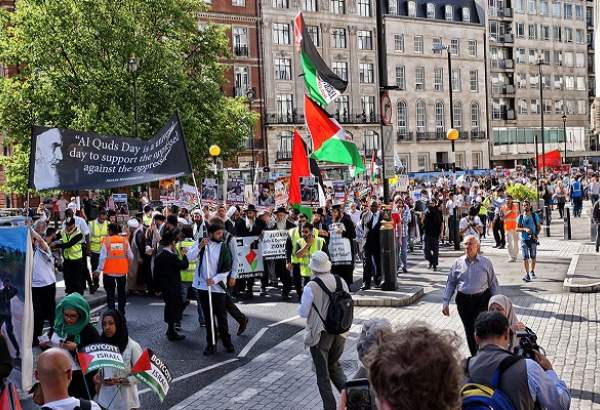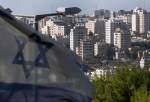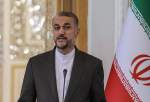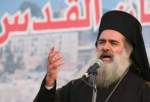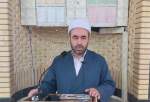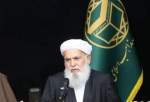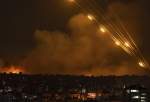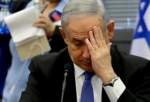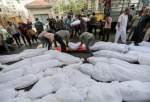The Islamic Human Rights Commission (IHRC), a non-profit organization based in London, said on Thursday that the Justice for Palestine Committee will be streaming messages from a wide array of community leaders, activists and public figures to mark the occasion which falls on May 22.
The online event will include presentations about the plight of the Palestinian nation.
The forced cancellation of the annual marches around the world does not mean forgetting the Palestinians at this important time of the Islamic year, it added.
Britain-based organizations such as IHRC, Ahlulbayt Islamic Mission, Scottish Palestine Solidarity Campaign, CASMI, Jewish Network for Palestine, Campaign Against Criminalizing Communities, In Minds Human Rights Group, Lebanese Community in Scotland, Bahraini Community, Islamic Student Associations, and Neturei Karta have thrown their weight behind this year’s rallies and marches.
Every year on the last Friday of the holy month of Ramadan, worldwide rallies are held to commemorate the Palestinian people’s resistance against Israel and their struggle to liberate their territories which have been occupied by Israel for decades.
The annual event is seen as an opportunity for freedom-seeking people across the world, regardless of faith, to voice their support for the cause of Palestine and vent their anger against the Apartheid regime of Israel, which has occupied Palestinian territories since 1967.
The International Quds Day is seen as the legacy of the late founder of the Islamic Republic of Iran, Imam Khomeini, who is revered as a spiritual leader by Muslims across the world. Back in 1979, shortly after leading an Islamic Revolution which toppled the US-backed Shah of Iran, Ayatollah Khomeini named the last Friday of the fasting month of Ramadan as the Quds Day.
Nosratollah Lotfi, the deputy chief of the Coordinating Council of Iran’s Islamic Propagation Organization, earlier said the Quds Day will be marked differently in the areas designated as white, yellow and red based on the number of COVID-19 infections and fatalities.
There are three plans for the occasion: the first is holding demonstrations after Friday prayers in the cities which obtain the permission and the second involves families rallying in their cars while observing social distancing guidelines, he said.
The third option, he added, is staging a virtual rally by carrying the flags of Palestine and torching US and Israeli flags.
Brigadier General Ramezan Sharif, spokesman for Iran’s Islamic Revolution Guards Corps (IRGC), announced that Leader of the Islamic Revolution Ayatollah Seyyed Ali Khamenei will deliver a speech on the occasion of the International Quds Day.
This year’s Quds Day is of special importance given US President Donald Trump’s pro-Israel polices that have emboldened the Tel Aviv regime.
In January, Trump unveiled his self-proclaimed “deal of the century” with the aim of legitimizing Israel’s occupation and re-drawing the Middle East map.
The scheme calls for the creation of a Palestinian state with limited control over its own security and borders. It also bars Palestinian refugees from returning to their homeland, enshrines Jerusalem al-Quds as “Israel’s undivided capital” and allows the regime to annex settlements and the Jordan Valley.
The Israeli regime has also been facing increasing isolation among nations across the world. A global movement called Boycott, Divestment and Sanctions (BDS) is one of the popular campaigns launched against Israel in an effort to force the regime to comply with international law and Palestinian rights.
Initiated by non-governmental Palestinian groups back in 2005, the movement has been gaining momentum in recent years.
Many universities, trade unions and organizations as well as human rights groups in Europe and North America have been joining the campaign.
The BDS is similar to the earlier boycotts of South Africa during its apartheid era and is aimed at piling up economic pressure on Israel by boycotting Israeli products and companies.
The BDS is estimated to cost Israel's economy $1.4 billion annually. It is expected to cost Israel's economy $47 billion over a decade.
Anti-Israeli sentiments have also been gaining ground on a regular basis following Tel Aviv's onslaughts on the besieged Gaza Strip which have killed thousands of people, many of them women and children, since 2009.
The attacks were launched amid a muted response from the so-called international community which is spearheaded by the US - Israel's staunch ally.
However, they raised global awareness of Israeli atrocities against the people of Palestine. Tel Aviv is now facing charges of war crimes over its military strikes against the impoverished enclave which has been under a crippling Israeli siege since 2007.

